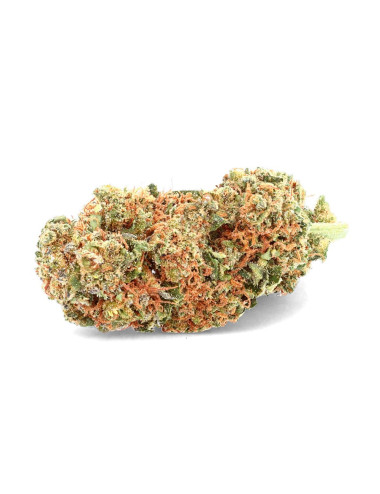What is THC?
Definition and meaning of THC
Loss of control, addiction, hallucinations... THC's reputation is not pretty. For a long time, the molecule was blamed for all the ills attributed to cannabis.
This is still true today in many countries, starting with France, which boasts one of the most restrictive legal frameworks in Europe in terms of hemp consumption. With the arrival on the market of perfectly legal CBD-rich products, however, minds are slowly but surely beginning to open up.
Despite all this, THC remains little known to the general public, at least beyond the surface. Far from singing its praises, this article attempts to step back and take an objective look at the cannabinoid that provokes the strongest reactions.
THC, definition and meaning
THC, or tetrahydrocannabinol (Δ-9-tetrahydrocannabinol in its full form), is a molecule belonging to the cannabinoid family, along with CBD, CBN and CBG. It is therefore naturally produced by cannabis and is even the cannabinoid most naturally present in the plant. Apart from the plant's predisposition to produce it, this is partly explained by the fact that hemp was one of the very first plants domesticated by man. THC's effects are more powerful and easily identifiable without laboratory tests, so for millennia mankind has unwittingly favoured the cultivation of plants with high concentrations of tetrahydrocannabinol. As a result, there are fewer CBD-rich varieties available today.
Its effects were identified millennia ago, and numerous civilizations have exploited its effects throughout history. However, it wasn't until 1964 and the work of Israeli researchers Raphael Mechoulam and Yechiel Gaoni that the molecule was isolated.
A simple definition of THC is that it is the main active molecule in cannabis. In the wild, THC content averages between 4% and 10%. Depending on variety and hybridization, however, it is not uncommon to find human-modified strains with THC levels in excess of 20%.
THC, a cannabinoid like no other
Like other cannabinoids, THC is able to bind to the CB1 and CB2 sensors of our endocannabinoid system. Able to communicate with our nervous and immune systems, this explains why THC causes effects in the human body. Unlike other cannabinoids, however, its effects are such as to place it squarely in the box reserved by law for narcotics.
Effects of THC on the body
Like CBD, tetrahydrocannabinol has analgesic properties, giving it the ability to soothe certain types of pain. It is best known for its psychoactive effects, leading to a certain loss of control on the part of the consumer, the famous "high" (excitement) or "stone" (lymphatic state) often pronounced a little at random without really understanding the implications.
While THC's effects on the human body are broadly similar, we all react differently to cannabinoid receptors. This is true not only for THC, but also for CBD, which produces effects that are more or less significant, but never harmful. This phenomenon, which is explained by our genetic differences, our build and our current state of mind, has a name: the law of effect.
Risks of using THC
In Europe, THC is considered a narcotic and its use is therefore prohibited in most cases. Several countries, however, authorize its use, either for therapeutic purposes only, or for recreational use as well, such as Canada. Before consuming THC, there are two main risks to consider: what the molecule can do to your own body, and what it can do to society. And therefore the risks to the law.
For the organization
At moderate doses, THC's effects are mainly temporary (mainly high and analgesic). It is also addictive, encouraging users to take more of it, more often. At high doses, however, it can cause nervous system depression.
An intravenous lethal dose was demonstrated in rats in 1971. Continued in dogs and monkeys, however, the study revealed that it seems impossible to achieve a lethal dose of THC in these animals by the oral route. Consequently, a lethal overdose in humans by smoking THC, whatever the quantity, seems impossible.
Even if the danger is not lethal, THC can cause various side effects of varying degrees of severity and/or discomfort:
- Psychotropic effects (mostly 30 minutes after THC intake, with peak effects lasting around two hours).
- High shortly after consumption): euphoria, carefreeness, laughter, openness to others.
- Down (when THC is eliminated from the body): physical and mental slowdown, fear.
- Decreased attention and judgment.
- Short- and medium-term memory loss .
- Reduced efficiency of the immune system.
- Irritability.
- Personality change(long-term).
Vis-à-vis the law
European law has long tolerated a tetrahydrocannabinol level of 0.2% in CBD-rich products. However, the European Parliament has approved a move to a THC level of 0.3%, which should be applied as early as 2023 if the European Commission confirms its decision. In France, where the law is relatively restrictive, there is still 0 tolerance in terms of controls. They can be carried out in the event of involvement in a court case, during routine road safety checks, and even in the workplace under certain conditions (handling of machinery or toxic products in particular). In the event of a positive test, fines and prison sentences are possible.
For simple consumption or possession of cannabis THC during a routine check, afixed fine of €200 for drug use is the most common penalty (reduced to €150 if paid promptly, within 15 days). It is accompanied by a criminal record entry, perhaps at least as discouraging as the fine itself. If you use cannabis THC while driving, the penalties are more severe, a direct consequence of the dangerous behavioral changes brought about by tetrahydrocannabinol. Trafficking in cannabis THC is also heavily punished, with fines and prison sentences varying according to the nature of the structure and its size.
THC opportunities
So, after reading the definition of THC, the sentence is clear? THC is the nasty little devil demonizing cannabis in the eyes of the world, and CBD is the perfect little cherub trying to rebuild a worthy reputation for it? It's not quite that simple. While cannabidiol (CBD) has little to reproach itself for (let's not forget that it's not addictive and has no major side effects), THC is not as devoid of interest (other than recreational) as one might think.
Its effects are being studied in the fight against cancer and multiple sclerosis. Not only have initial studies shown that a properly dosed and targeted intake of tetrahydrocannabinol could help limit the development of certain tumors, but it is also known for its ability to stimulate appetite, earning it the interest of the scientific community in the alleviation of nausea due to certain heavy treatments such as chemotherapy.
The future and advances in science will undoubtedly enable us to discover much more about THC, CBD and other cannabinoids in the near future!







